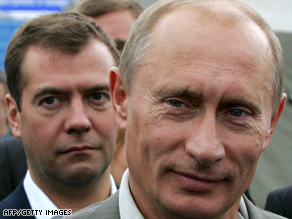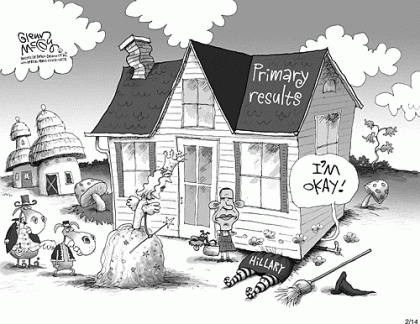Dmitry Medvedev, hand-picked predecessor to Vladimir Putin, won the Russian Presidential elections by a landslide earlier this month. The elections themselves received mixed reviews. France and Germany both criticized the nation for the lack of competition in the races, and suspect the results were swayed by multiple voting and ballot stuffing. One the other hand, both the United States and Britain backed Russia, congratulating Medvedev on his victory and calling for closer relations under his leadership. As for the people of Russia, election procedures were not as important as election results. While many celebrated the victory, and look forward to another Putin-like figurehead, there was opposition as well. Over 2,000 people took to the streets in anti-Kremlin and anti-Putin protests.
It is equally important to determine what the results mean for both Russia and the international community. It appears that Medvedev will keep most of Putin’s policies in tact, especially with Putin serving as Prime Minister below him. Putin is well known for his strong economic policies (their economy grew 8% last year alone), but also his willingness to defy the Western Nations on global affairs. As Roland Nash of Renaissance Capitol explains, Medvedev’s win probably equates to a change in style, but not in substance. But even with the same fundamental beliefs, Business Week writer Jason Bush concludes that Medvedev is actually a little more liberal, and has hinted he may make minor changes to economic policies.
Ultimately, Russia and the rest of the world will stay status quo. The same type of domestic policies are going to reach the citizens of Russia, and other world powers will face the same roadblocks as they had under Putin. As Business Week points out, this may be good, especially economically. In these unstable times, the global market isn’t likely to face any major reforms in Russian policy. At the same time, Putin’s controversial Kremlin remains in-tact—often considered a bad thing. Whether or not you’ll like Medvedev can probably be determined by whether or not you liked Putin.
Sources:
http://www.reuters.com/article/politicsNews/idUSN0333318820080303
Filed under: Uncategorized
By Glenn McCoy (http://www.uclick.com/client/nyt/gm/)
Filed under: Britain, International | Tags: 1960s, 1970s, Britain, disillusionment, Economy
Before I get into the negatives of the 60s and 70s, it’s important to explain where the ‘disilllusionment’ part of it comes in. I rewind a decade to the 1950s.
The 1950s were about rebuilding and enjoying new freedom. The war in the 30s and 40s put a lot of social and economic pressure on the country–sons were sent to the frontlines, families had to face food rationing, and the economy was focused on supplying for battle. By the 1950s, rationing had ended, and people were ready to celebrate their whole families again. Of course it wasn’t a problem-free time, but it was, I think, both hopeful and grateful. So when the immigration issues, racism, riots, and economic decline began in the 60s, people weren’t exactly thrilled. These problems only got worse in the 70s.
Ironically, the immigration issues Americans are facing today are similar to the problems Britain faced 40 years ago. After the war, migrants began looking for work, and found their way up to Britain. As Ruth Brown notes in her article from the Internatinal Socialim Journal, “By the early 1970s around 11 million migrant workers from southern Europe and the colonies were working in the economies of northern and western Europe” (1). Many British citizens blamed the migrants for the high unemployment rates that began in the 60s, and escalated to over 3 million people in the late 80s (2). This is also the root of the racism that sprung from the immigration issues. Britain passed a series of immigration reforms in attempt to limit migrant numbers, including the Commonwealth Immigrants Act of 1962, which was largely unsuccessful. It’s important to note that even politics were driven by what I’d call a racist mindset.
In all, the popular disillusionment of the 1960s and 1970s was due to the issues Britain
faced after a decade of hope and freedom.
1. http://pubs.socialistreviewindex.org.uk/isj68/brown.htm
2. http://news.bbc.co.uk/onthisday/hi/dates/stories/january/26/newsid_2506000/ 2506335.stm.
NYT posted an intersting article today about President Bush’s wonderful economic plan for
2008. The article begins like this:
“President Bush submitted a federal budget of $3.1 trillion on Monday, declaring that the spending plan would keep the United States safe and prosperous and, despite its record size, would adhere to his principle of letting Americans keep as much of their own money as possible…’We are now on a path to balance the budget by 2012,’ the president said in an introductory message.”
Let’s look at this–according to Bush, record spending=balanced budget. Maybe I’m
missing something. I’m not going to pretend to understand most things economic,
but the last time I checked, you had to stop spending money to balance a budget with a
large deficit. The article goes on to state that the budget for the military is up 7.5%, and that:
“Mr. Bush’s proposed budget, the first in the nation’s history to exceed $3 trillion, foresees near-record deficits just ahead — $410 billion in the current fiscal year, on spending of $2.9 trillion, and $407 billion for the fiscal year that begins Oct. 1 — before the budget would come into balance in 2012.
But the total federal debt held by the public — that is, the accumulated total of all federal borrowing — has grown substantially in recent years. It was $3.3 trillion in 2001, when President Bush took office, and is expected to climb to $5.4 trillion this year and $5.9 trillion in 2009, according to budget documents issued by the White House on Monday. As a share of the economy, federal debt held by the public is expected to reach 39 percent of the gross domestic product in 2009, up from 33 percent in 2001.”
Now I don’t necessarily expect to have our country with a balanced budget during a time
of war, but I also think we overdid it a little with a debt in the trillions. Accoding to http://www.brillig.com/debt_clock/, each person would have to contribute over $30,000 if we wanted to eliminate our country’s debt. I’m a little concerned…
I’ll stick to my instincts and say that McCain and Clinton win. Of 24 states vote, California will obviously hold the most weight, but Illinios and New York will be important as well.
Sources (http://cbs5.com/local/Clinton.Obama.California.2.645754.html) say that Clinton and Obama are virtually tied in CA, so it’s up in the air as to who will win the state. While Obama has people like Kennedy and Oprah pulling for him, Hillary has Bill and the hispanics, which make up a large percentage of much of the southwest, CA included. Earlier in the race, CA held a large majority for Clinton. For this reason, I conclude that Clinton beats Obama by a small percentage.
The Republicans are also a hard to determine. According to that same article, polls show that McCain has an 8-point lead in CA over Romney, but 15% of voters were still undecided. I’d have to say that McCain is going to pull it out, simply because Huckabee is farther behind and McCain…is just better than Romney. I think his military experience will pull him through with Republican voters.
So McCain and Clinton win CA. As for the other 23 states, I believe McCain will end up
winning most of the Republican primaries. The Democratic primary will be a lot closer,
but I have a feeling I’ll be disappointed with the results in the end.
Ties between Britain and Russia are becoming increasingly tense as a British cultural
organization was forced to close its office in St. Petersburg, Russia a couple of weeks
ago. Ties have been tense ever since a KGB officer from Russia died in London in
2006. The death has been disputed ever since, and cooperation is becoming worse
between the two countries. The article states that Putin turned his back on Blair’s
offer for cooperation when he was in office, but now Brown is taking a harder approach
in response to Putin’s actions.
Frankly, I think this scenerio is just a reflection of the relationship between Russia and
(much of) the rest of the world. Putin has made is country more stable and more of a
pressence in the world, but at what cost? The tensions present now between countries
like Britain and the United States will only get worse, and that’s when problems are
created. Russia is becoming more powerful at a fast rate, and tension now will hurt us
in the future.


